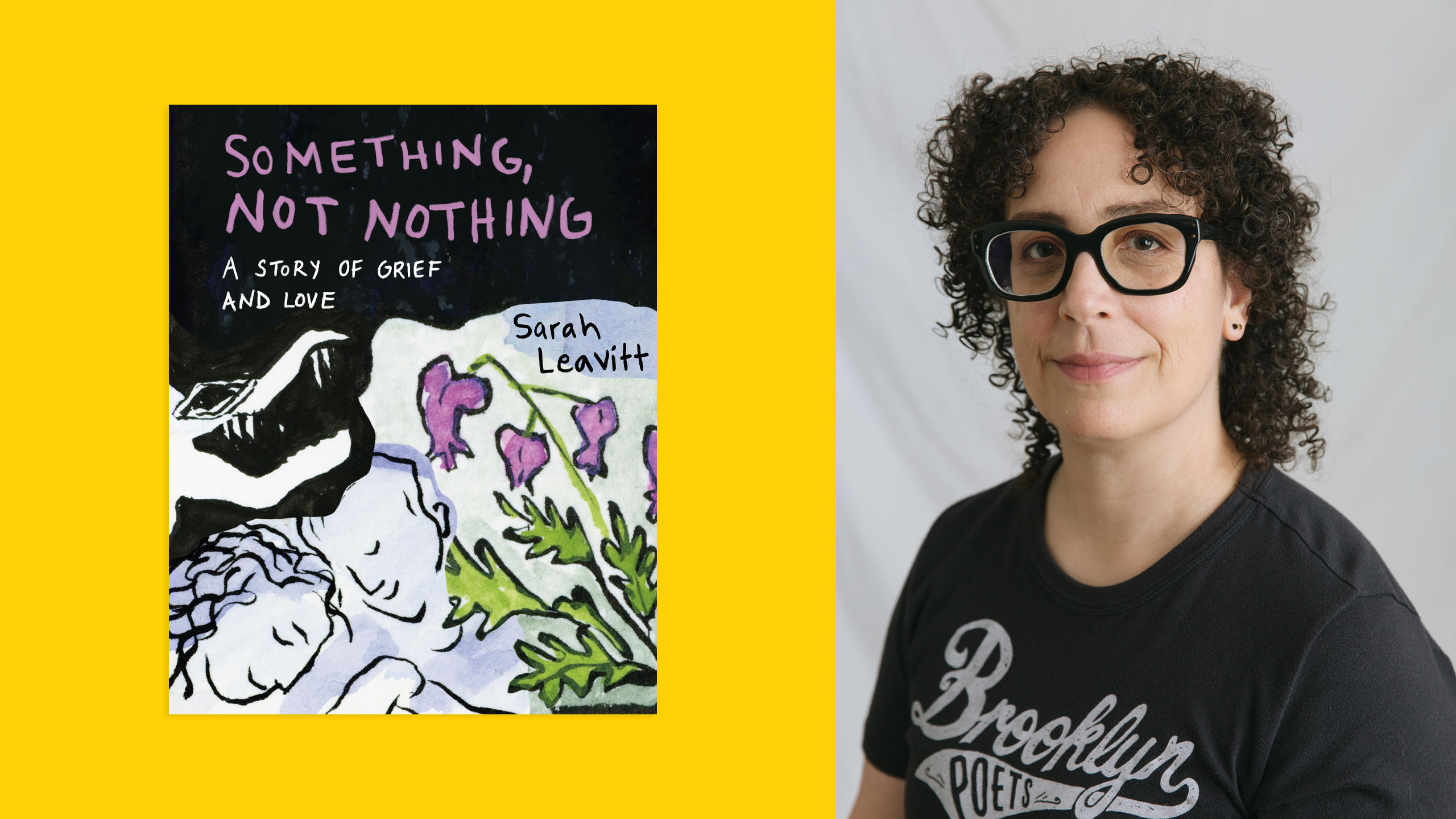When I began reading Sarah Leavitt’s Something, Not Nothing: A Story of Grief and Love, I had just returned from the college town I used to live in where I was attending a posthumous album release for a friend who received medical assistance in dying (MAiD) almost exactly a year before. This was the second person I knew who chose to receive MAiD; the third was peripheral—someone close to someone I am close to—the fourth is pending, someone I know who was approved and is thus far still here. It occurred to me that this was an unusual amount of experience to have with MAiD, even if none of those experiences were of losing my closest people.
Because MAiD in Canada is relatively new, or more recently more accessible than it previously had been, there are not a lot of written accounts of it. When my aunt’s life ended this way, on her terms, after a long legal battle, I read Miriam Toews’s All My Puny Sorrows, the closest thing I could find in CanLit (and even that employs a Swiss clinic).
I’d been waiting for Leavitt to release a new memoir after reading Tangles: A Story About Alzheimer’s, My Mother, and Me, which details her family’s experience of her mother’s early onset Alzheimer’s, in 2010. It’s the book I most often recommend to people looking to read a graphic memoir (a memoir in comics, that is, not a memoir that is graphic in nature), along with Nicole Georges’s books and, more obviously, Alison Bechdel’s. (Leavitt has a book between memoirs, a graphic novel of historical fiction called Agnes, Murderess.) I wish, for Leavitt’s sake, that this one wasn’t also about the loss of a loved one—and yet, she writes about this theme so beautifully.
Something, Not Nothing is the story of Leavitt’s partner of 22 years, Donimo, receiving MAiD in spring of 2020 and the aftermath thereof. It’s about a life suddenly, and in ways not so suddenly, being turned upside down. It’s the other side of anticipatory grief. It’s about anger and love in loss, and the replaying of moments both quiet and loud.
And it is remarkably queer, not just by the virtue of the relationship being queer, but also by the community built around Sarah and Donimo, the flashback to the setting where they met, the words on Donimo’s gravestone, the offhanded references to gender presentation and more.
Tangles is an interesting contrast to this book, because it is so much more of a common experience, even though all of the specifics are so personal. It’s something that I imagine a wider scope of people find relatable at this point in time. But Something, Not Nothing uses a lot of the same sparseness and specificity, alongside unavoidable dark humour. It brings in more rawness and abstraction both artistically and in the text. Leavitt also expertly shows where exactly drawing lumpy horses (her words) fits into the grief process.
When I say I think dark humour is unavoidable, I think this is true death at large, to an extent—but that MAiD has a level of surrealness to it that lends itself to this on another level. At my friend’s living wake, I am told, he saw people off with a variety of phrases like “See you later!” and “Catch you on the flip side!”—which might be vastly inappropriate or entirely appropriate. (He was, it’s been said over and over again, also very good at telling people that he loved them, and also did that—it wasn’t all jokes.)
My first experience of MAiD, my aunt’s death, occurred on a time difference. I was obsessed with calling my cousins at the wrong time. With whether or not to call at all. If someone would call to tell me she’d passed, even though I knew it was happening in advance. That time, I encountered the absurdity of booking a plane ticket to a funeral of a person who was still alive at the time. “Will someone let me know if she changes her mind?,” “What if it doesn’t work?” It’s not “ha-ha” funny, but there is unmistakable humour in it.
Leavitt captures both this and the intensity of lost love profoundly, in few words. “How does one prepare to die the next day?” she writes. “When do you start leaving?” She tells the story of Donimo saying she needed to rest up for the next day, her last. That concept stuck with me. How would I plan my last day; how did my friend or my aunt plan theirs? I remember—again, not funny “ha-ha,” but still—wondering if the professionals administering things would go through with it if my friend showed up drunk from the night before. You can’t get a tattoo while intoxicated; surely you can’t consent to die.
In line with the way that I couldn’t look at the clock when my aunt was scheduled to die, and I opted not to know the time for my friend’s death, I stopped reading as I hit page 26 of Something, Not Nothing at least five times. “The IV was ready. The doctor was ready.” I, a stranger, kept closing the book, as though it would change the outcome.
“It’s been a year since the ending started,” Leavitt writes in one place, perfectly capturing the greyness between beginnings and endings of this sort. She is also able to put into words and images the ideas of grief as nonlinear, and the familiar feeling that death may be temporary, only to remember that it is not. She writes about coming out of “violent grief” and the acute stage passing as a loss in and of itself.
Ultimately, what Leavitt manages to capture, which, to be honest, seems like it should be impossible, is how MAiD can be personal, and how you can hold respect for your loved one and mourn life as you knew it at the same time. The most bizarre part of MAiD, in my experience, (though, perhaps blurry with suicide) is needing to talk yourself out of asking “Why?” “Why did you have to get sick?,” perhaps. “Why did life have to be so unbearable for you?,” certainly. But “Why are you gone?” takes on a different shape. Leavitt manages to capture that knowing and the accompanying feelings of abandonment gracefully.


 Why you can trust Xtra
Why you can trust Xtra


